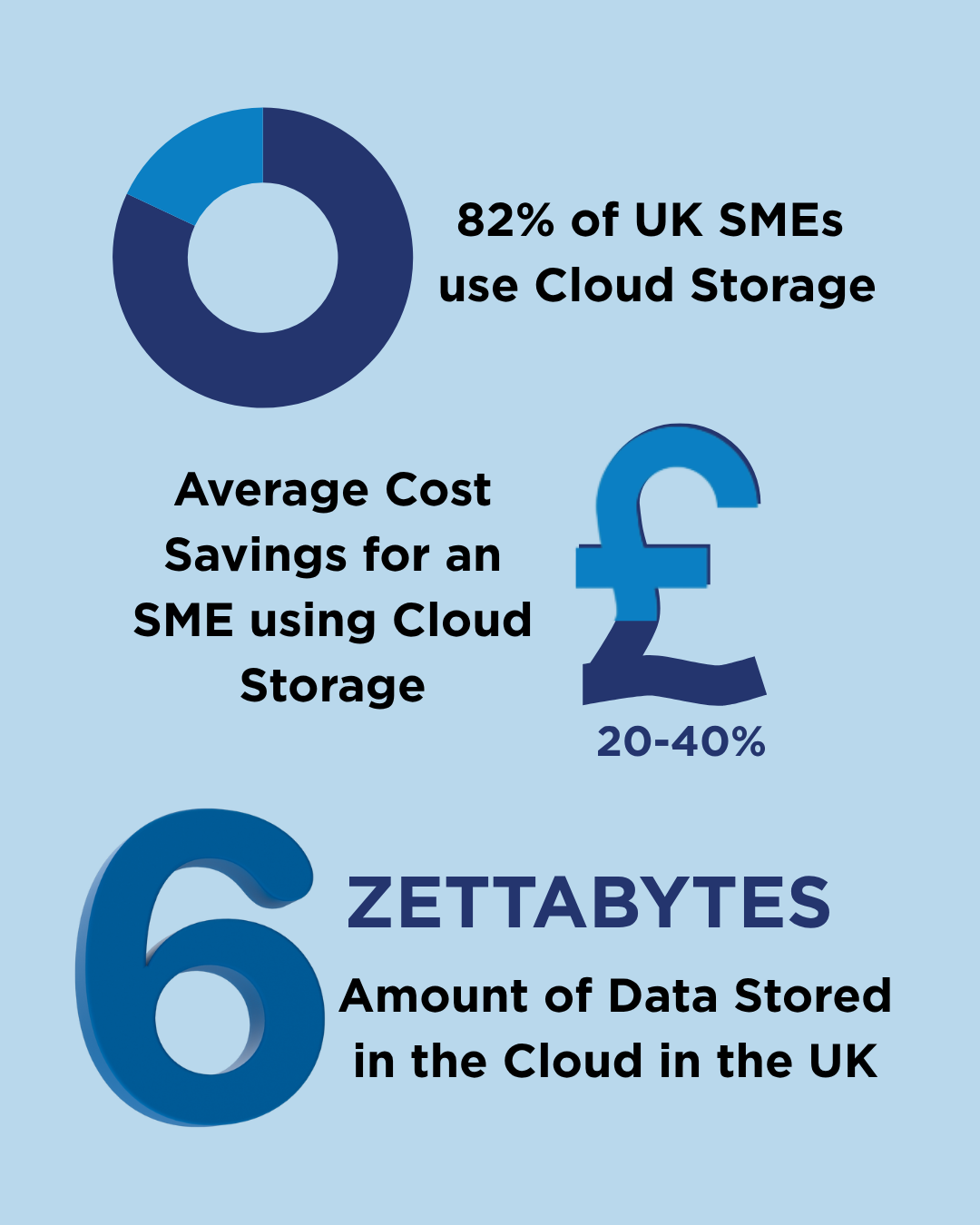
Cloud storage has fundamentally changed how businesses manage, share, and safeguard their data. What was once limited to on-site servers and hardware investments is now an elastic, on-demand service that empowers organisations to grow without limits. It offers convenience, scalability, and accessibility – but as with any major shift in technology, it comes with its own challenges. From data security and compliance to hidden costs and provider dependency, understanding both the benefits and potential pitfalls of cloud storage is essential before fully committing your business to it.
In this guide, we’ll explore the many advantages and drawbacks of cloud storage in detail. We’ll also look at practical ways to protect your business, ensuring your data stays secure, compliant, and cost-effective as you grow.
What is cloud storage (and why it matters for businesses)
Cloud storage is the process of saving your business data on remote servers rather than local hardware. These servers are owned, maintained, and protected by major providers such as Microsoft Azure, Amazon Web Services (AWS), and Google Cloud. Your information is transmitted securely over the internet, stored in dedicated data centres, and made available to authorised users from anywhere in the world.
For most small and mid-sized businesses, cloud storage is no longer a luxury – it’s a necessity. It eliminates the cost and complexity of running physical infrastructure, allows remote teams to collaborate seamlessly, and makes data recovery faster and easier in the event of an incident. In many cases, it can even enhance security beyond what’s achievable with traditional on-site systems.
It’s a cornerstone of modern digital transformation – helping businesses simplify their IT operations, improve efficiency, and stay competitive in a fast-paced world.
The benefits of cloud storage
The rise of cloud storage isn’t just a passing trend. It represents a shift in how organisations think about data management. When managed correctly, it offers a wide range of benefits that can improve productivity, resilience, and profitability.
1. Scalability and flexibility
Traditional storage systems require you to predict future capacity and purchase expensive hardware up front. Cloud storage eliminates that guesswork. You can scale resources up or down in real-time, paying only for what you need. This flexibility supports rapid growth, seasonal changes, and evolving workloads without costly downtime or equipment upgrades.
It’s particularly valuable for businesses operating in fast-moving industries where storage needs can change overnight. With the cloud, you can stay agile without being held back by hardware limitations.
2. Cost efficiency
Cloud storage replaces large capital expenses with manageable, predictable operational costs. You’re no longer paying for servers that sit idle or ageing hardware that needs maintenance. Instead, you pay based on usage, freeing up cash flow for more strategic investments.
That said, managing costs effectively requires visibility. Without regular audits or monitoring, data duplication, unnecessary backups, and unplanned service add-ons can cause bills to rise faster than expected. A clear cost management plan is vital to keeping things under control.
3. Collaboration and remote work
The cloud has transformed how teams work together. Instead of relying on local drives or endless email attachments, your employees can access and edit shared documents in real time from any location. It simplifies project workflows, improves productivity, and supports hybrid and remote working models – now the norm for many organisations.
In short, cloud storage makes collaboration faster, cleaner, and more reliable – giving teams the freedom to work how and where they’re most effective.
4. Disaster recovery and business continuity
Data loss can cripple a business, but cloud storage offers an extra layer of protection. Most providers automatically replicate data across multiple geographic locations, ensuring that if one data centre experiences an outage, your files remain available from another. This built-in redundancy means faster recovery and greater resilience during unexpected disruptions such as cyberattacks or hardware failures.
5. Strong built-in security
Security is a major selling point for cloud platforms. Providers like AWS, Azure, and Google Cloud invest heavily in encryption, 24/7 monitoring, and intrusion prevention. Their data centres are equipped with physical and digital safeguards that go far beyond what most small businesses could afford to implement on their own.
However, security in the cloud is shared. Providers handle infrastructure protection, but you’re responsible for user access, password policies, and internal compliance. When both sides work together, cloud security can often surpass what’s achievable with on-site systems.
The risks and drawbacks of cloud storage
While cloud storage offers undeniable advantages, it’s not without its downsides. Understanding these risks helps you avoid common pitfalls and make more informed decisions.
1. Internet dependence
Cloud storage depends entirely on your internet connection. Without reliable connectivity, your access to data is at risk. Even short outages can cause significant disruption, especially for businesses that rely on constant access to files or systems. Investing in redundant connections or backup internet options can help mitigate this risk.
2. Vendor lock-in
Each cloud provider uses unique systems, APIs, and management tools. Once your business is deeply integrated with one platform, moving away can be expensive and technically complex. Transferring data may incur additional fees, and certain applications may not function properly elsewhere. To avoid being trapped, plan an exit strategy early – including how you’ll migrate and how long it will take.
3. Compliance and data residency
If your business handles customer information or sensitive data, compliance with standards like GDPR, HIPAA, or PCI DSS is essential. However, storing data in the cloud can complicate matters if your provider’s servers are located in multiple countries. You need to know exactly where your data resides, who has access to it, and whether it’s protected under the right legal frameworks.
4. Hidden and variable costs
At first glance, cloud storage looks affordable. But costs can escalate quickly due to additional storage tiers, data retrieval fees, and over-provisioning. Without regular monitoring, it’s easy to lose track of what you’re paying for. Using built-in management tools and reviewing usage reports monthly can help prevent unpleasant surprises.
5. Reduced control
Hosting data externally means handing over some degree of control. You can’t customise every aspect of the infrastructure or apply every internal policy you might prefer. For industries where data sovereignty or specific configurations are required, this can create compliance and operational challenges.
Is cloud storage fully reliable?
Most of the time, yes – but it’s not completely perfect. On 20 October 2025, Amazon Web Services (AWS) had a temporary outage caused by a problem with its internal directory system – the part that helps computers find and connect to the right services, a bit like an online address book.
The issue lasted only a few hours but still caused brief interruptions for well-known companies and public services. It was a rare event, yet a helpful reminder that even the biggest providers can experience hiccups.
The key is to make sure your business has good backup and continuity plans in place, so that if one service pauses, everything else keeps running smoothly.
How to protect your business when using cloud storage
The best way to manage cloud storage risks is through careful planning, transparency, and proactive monitoring. With the right strategy, you can gain all the advantages while keeping your business safe.
1. Choose a transparent, trustworthy provider
Pick a provider that values transparency and security as much as you do. Look for clear compliance documentation, customer reviews, and certifications such as ISO 27001 or Cyber Essentials Plus. Ensure your provider offers data residency within your preferred region and clear visibility into where your data is stored.
2. Adopt a multi-cloud or hybrid strategy
No single provider is perfect. A hybrid approach – blending private and public cloud environments – or a multi-cloud setup can spread risk and improve resilience. This strategy helps you avoid dependency, balance workloads, and choose the best tools for each part of your operation.
3. Encrypt and back up everything
Always use strong encryption, both in transit and at rest. Even if your provider offers backups, maintain your own separate copies. This approach ensures you stay protected against accidental deletions, data corruption, or provider outages.
4. Conduct regular security and compliance audits
Cloud setups evolve over time, and so do risks. Schedule routine reviews of your security controls, access permissions, and compliance requirements. Tools that detect anomalies or unauthorised access early can save your business from costly incidents.
5. Plan your exit strategy now
Even if you’re satisfied with your provider, circumstances can change. Have a clear exit plan in place, documenting where your data lives, how to retrieve it, and what dependencies exist. Test this process annually to ensure a smooth transition if you ever need to switch.
Trends shaping cloud storage in 2025
Cloud technology is advancing rapidly, and staying aware of key developments helps your business stay competitive.

AI-driven storage management
Artificial intelligence is revolutionising cloud storage by automating data organisation, monitoring performance, and optimising costs. AI systems can identify redundant files, allocate resources efficientl
y, and even predict future capacity needs – but they still require human oversight to maintain accuracy.
Green and sustainable cloud operations
Sustainability is becoming a driving force in IT decision-making. Data centres are major energy consumers, but leading providers are investing heavily in renewable power, advanced cooling systems, and carbon-neutral initiatives. Choosing a sustainable provider can help you meet ESG goals while improving operational efficiency.
Edge and distributed storage
To reduce latency and boost performance, data is increasingly being stored and processed closer to its source – a concept known as edge storage. This decentralised model offers speed and reliability but introduces new security and management challenges that businesses need to plan for.
Increased focus on resilience
After a series of high-profile outages, cloud providers have doubled down on redundancy and reliability. Expect to see more robust service-level agreements (SLAs), automated failover systems, and an overall emphasis on continuity and shared responsibility.
FAQs about cloud storage benefits and risks
What are the main benefits of cloud storage for SMEs?
Scalability, flexibility, and predictable costs. It enables smaller businesses to operate with enterprise-level capability without major upfront investments.
What are the main risks?
Vendor lock-in, compliance complexities, internet dependency, and unexpected costs.
Is cloud storage secure for sensitive data?
Yes – with the right setup. Use encryption, strong access control, and regular security reviews to protect sensitive information.
How can businesses avoid vendor lock-in?
Use open standards, maintain off-cloud backups, and include data portability clauses in your contracts.
ERGOS thoughts: balance the benefits, manage the risks
Cloud storage is one of the most valuable tools modern businesses can use – when managed with care. The goal isn’t to avoid the cloud, but to approach it strategically, understanding its strengths and weaknesses.
At ERGOS, we help organisations design secure, compliant, and scalable cloud environments that make IT simple and stress-free. From planning and setup to ongoing optimisation, our experts ensure your cloud works for you – not against you.
If you’d like help creating a tailored cloud strategy that protects your data and your bottom line, get in touch with the ERGOS team today.



